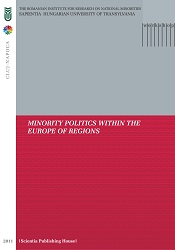The Protection of the Mother Tongue of National and Ethnic Minority Communities in the Republic of Croatia
The Protection of the Mother Tongue of National and Ethnic Minority Communities in the Republic of Croatia
Author(s): Goran Bandov
Subject(s): Politics / Political Sciences
Published by: Scientia Kiadó
Keywords: group identification; ethno-political conflict;Croatia;minority education;independence;
Summary/Abstract: In the academic discourse of South-East Europe, language plays the central role in protecting the cultural dimension of national identity, and further holds a strong influence over the national political identity (in terms of group identification) for members of minority groups. This discourse recognises the importance of mother tongue as the constructing element of the elites in the process of nation-building as independent subjects of international relations in South-East Europe. The non-implementation of measures that protect mother languages may be interpreted as a direct attack on the national identity of the respective minority groups and an effective incentive for the escalation of ethno-political conflict. Therefore, the execution of broad language protection mechanisms is essential in avoiding such conflict. Within the territory of the Republic of Croatia, the system of mother language protection for national and ethnic minority communities has been effectively implemented since the period beginning after the Second World War. Furthermore, these protective institutions have decidedly strengthened during the period of democratic transition and Croatia’s movement toward its independence from Yugoslavia beginning the 1990s. This process itself had a significant impact on the magnitude and structure of the protection of minority groups largely because it introduced a host of new minority groups. Prior to Croatia’s gaining independence, protections were granted to Hungarian, Italian, Czech, Slovakian, Ukrainian, and Rusyn minority groups. In the period after independence, protective measures were extended to a number of other groups, including Serbians and others within the former-Yugoslavia. Today, these protections are granted to 22 different national and ethnic groups. The system of language protection in Croatia encompasses first and foremost the right to education in the language of a national minority group and the right to use minority language before administrative and judicial bodies. These rights have been recognised and guaranteed via a series of constitutional and legal norms whose implementation has been effectively controlled by European and Croatian legal bodies. Minority education is the most effective way of implementing language protection, which functions through the following models: model A (all classes are taught in the mother language); model B (classes of social studies are taught in the mother language while natural sciences are taught in Croatian); model C (all classes are taught in Croatian with compulsory additional classes of the minority language, tradition, and culture of a national minority group).
Book: MINORITY POLITICS WITHIN THE EUROPE OF REGIONS
- Page Range: 123-140
- Page Count: 18
- Publication Year: 2011
- Language: English
- Content File-PDF

